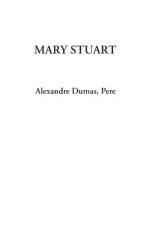“Is the battle lost, then?” demanded Mary, growing pale.
“No, madam, no,” cried Douglas; “Heaven be thanked, not yet; but through too great haste we have begun badly.”
“And William?” said Mary Stuart.
“He is now serving his apprenticeship in arms; for, if I am not mistaken, he must be at this moment at the very spot where those marksmen are making such quick firing.”
“Poor child!” cried the queen; “if ill should befall him, I shall never console myself.”
“Alas! madam,” replied Douglas, “I greatly fear that his first battle is his last, and that everything is already over for him; for, unless I mistake, there is his horse returning riderless.”
“Oh, my God! my God!” said the queen, weeping, and raising her hands to heaven, “it is then decreed that I should be fatal to all around me!”
George was not deceived: it was William’s horse coming back without his young master and covered with blood.
“Madam,” said Douglas, “we are ill placed here; let us gain that hillock on which is the Castle of Crookstone: from thence we shall survey the whole battlefield.”
“No, not there! not there!” said the queen in terror: “within that castle I came to spend the first days of my marriage with Darnley; it will bring me misfortune.”
“Well, beneath that yew-tree, then,” said George, pointing to another slight rise near the first; “but it is important for us to lose no detail of this engagement. Everything depends perhaps for your Majesty on an ill-judged manoeuvre or a lost moment.”
“Guide me, then,” the queen said; “for, as for me, I no longer see it. Each report of that terrible cannonade echoes to the depths of my heart.”
However well placed as was this eminence for overlooking from its summit the whole battlefield, the reiterated discharge of cannon and musketry covered it with such a cloud of smoke that it was impossible to make out from it anything but masses lost amid a murderous fog. At last, when an hour had passed in this desperate conflict, through the skirts of this sea of smoke the fugitives were seen to emerge and disperse in all directions, followed by the victors. Only, at that distance, it was impossible to make out who had gained or lost the battle, and the banners, which on both sides displayed the Scottish arms, could in no way clear up this confusion.
At that moment there was seen coming down from the Glasgow hillsides all the remaining reserve of Murray’s army; it was coming at full speed to engage in the fighting; but this manoeuvre might equally well have for its object the support of defeated friends as to complete the rout of the enemy. However, soon there was no longer any doubt; for this reserve charged the fugitives, amid whom it spread fresh confusion. The queen’s army was beaten. At the same time, three or four horsemen appeared on the hither side of the ravine, advancing at a gallop. Douglas recognised them as enemies.




